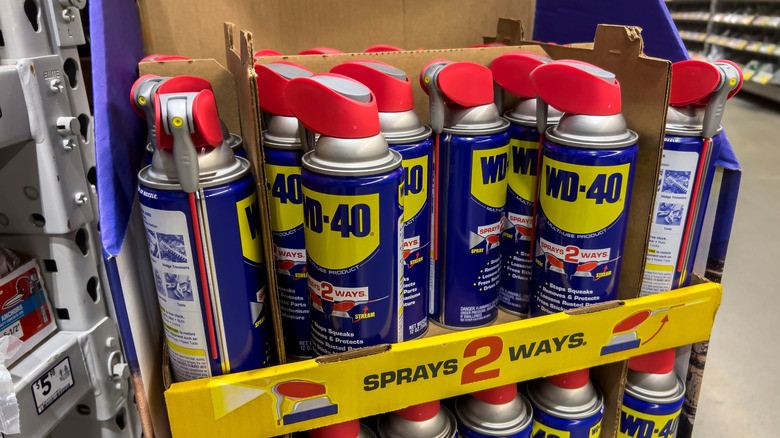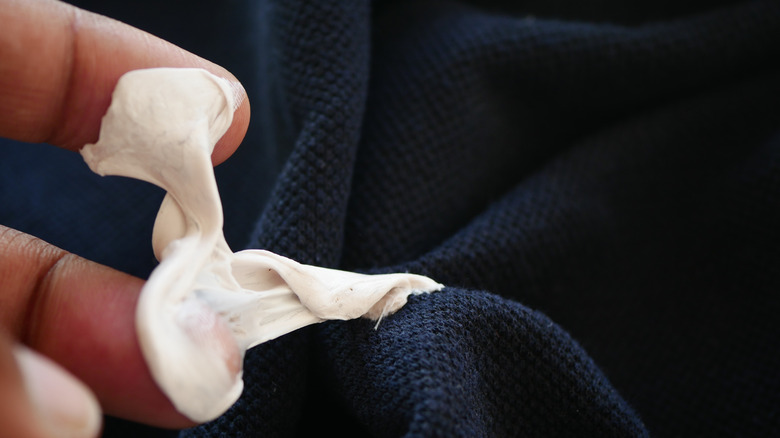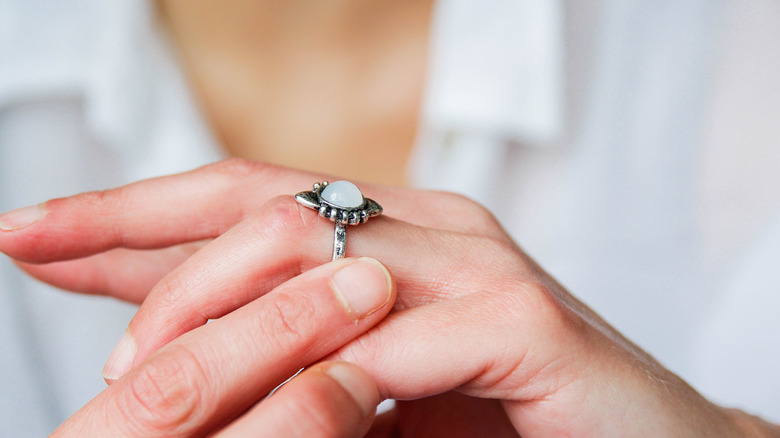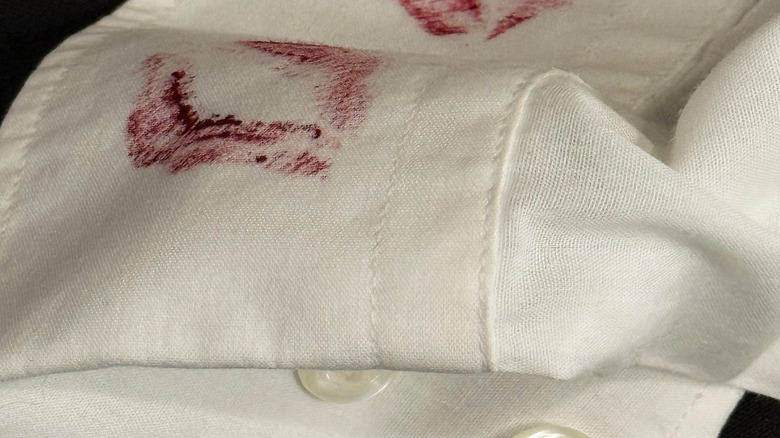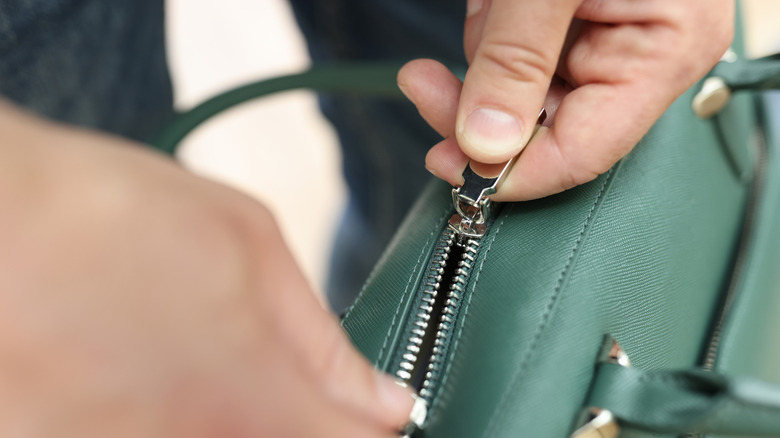5 Unexpected Ways To Use WD-40
We may receive a commission on purchases made from links.
There are few things in your garage that can match the versatility of WD-40. For car owners, it has been known to be the saving grace of issues that range from stuck car windows to removing built-up rust. But even for those who don't own a vehicle, it can prove to be a useful addition to your life in more ways than one. Despite having a few known potential health hazards, it's largely considered safe to use for a wide variety of applications. From different ways to apply it, like pods and pens, to use-specific offers in the form of its electric parts cleaner and contact cleaner, WD-40 comes in a ton of different product lines that you may not even realize exist. Typically, these are more optimized versions of the product that help it perform better for certain tasks.
However, because of WD-40's unique characteristics, most people have barely scratched the surface of what it can do. In the past, WD-40 has been used in oddly specific, but useful ways, such as keeping snakes away and catching burglars. But the magical WD-40 has a couple more tricks up its sleeve, and you'll be surprised to know all the neat ways it can be applied or at least work as a temporary solution for some annoying or unexpected problems.
Unstick hard gum
Chewing gum has been around for hundreds of years. A lot of people love gum for its various health benefits, like helping keep cavities at bay and making sure their breath always smells fresh. But there's a reason why countries like Singapore have steep fines if you're ever caught sticking it in places where it doesn't belong — no one likes the gross sensation of accidentally touching gum that is unceremoniously left on car seats, walls, or carpets. But, if you don't live in a city where there are set laws around disposing of chewing gum properly (or are around people with no manners), WD-40 can help clean them out.
To get rid of hardened gum on carpets with WD-40, you'll want to have the WD-40 Multi-Use Product Smart Straw on hand. Spray it and let it sit until the gum loosens from the fibers. If you find yourself still struggling to do so, you can also scrub it with a fingernail brush. Afterward, you can use a carpet cleaner to remove any remaining debris. As for removing gum from your shoes, the process is a little bit different. For this, WD-40 recommends soaking the gum in nail polish remover for a few minutes before using the Multi-Use Product Smart Straw to apply just enough WD-40 on the gum and not the rest of the shoe to avoid permanent stains on certain materials.
Loosen up, clean, or protect jewelry
Everyone knows that one thing that makes or breaks a look is having the right jewelry, unless it's all tangled up, which happens to the chains of bracelets or necklaces when they've been shoved into travel-sized boxes. In general, you can follow regular chain untangling tips, but if you want to hasten the process, a little spray of WD-40 can help get those knots out. WD-40 can also be used to remove stuck rings, which can happen due to everything from allergic reactions to exercise or even injury, though other WD-40 substitutes, such as petroleum jelly, vegetable oil, beeswax, or even melted butter, may work better.
WD-40 shares that you can also use it to remove rust from necklace chains, which can be more effective than DIY solutions that might damage the item. After soaking it in soapy water, you can proceed to spray the rusted areas with WD-40 to help loosen the rust. Once a few minutes have passed, you can use a microfiber cloth to wipe it before rinsing it with warm water one last time.
It's also a great way to keep gold jewelry sparkling. Start with a gold cleaning solution, like the Weiman Fine Jewelry Cleaner Liquid, then spray with WD-40 afterward. Afterward, WD-40 says you should rinse your gold jewelry in warm water and air dry. Similarly, WD-40 claims that you can also prevent tarnishing for silver jewelry and copper jewelry with the same steps.
Caring for your golf clubs
There's a reason why golf is often associated with the rich and famous. Apart from the expensive, must-have gadgets designed to elevate your game, there's also the steep initial investment for clubs, which NextRoundGolf claims will set you back up to $3,500 for a new, complete set. If you do decide to get secondhand, it mentions that you can cut the cost by about half. However, it's likely you'll need to give it a good clean and do some regular maintenance with WD-40 to make it last.
Since golf clubs are meant to be out in the elements, cleaning them is part and parcel of the experience. While you've probably already quickly rinsed it off after your game, it doesn't hurt to give it a deep clean with warm water and dish soap every once in a while. In some cases, a toothbrush can also come in handy for those little crevices. After you've wiped down your clubs, the next thing on your list should be polishing with a microfibre cloth. On Amazon, a popular American-made polishing solution is the under $30 Club Doctor Golf Club Polish, which over 1,600 people have given an average rating of 4.2 stars. Typically, you'll need to wait a few hours until it's fully dried. Last, but not least, you can end the day by wiping your clubs with WD-40 Multi-Use Product. According to WD-40, this helps prevent rusting and avoids dust buildup with its protective barrier.
Get rid of make up stains
Touching up makeup is a ritual for many women, but sometimes things happen, and things like lipstick can sometimes end up where they shouldn't, like your clothes or other surfaces. While some girls are forward-thinking and keep some make-up removing wipes in their purses, others can find themselves in a sticky situation without them. Thankfully, if there's no make-up remover solution in your home, it's possible that you might have some WD-40 lying around in your house that can also do the job. Although used in the context of cleaning carpets, WD-40 mentions that its WD-40 Multi-Use Product, sprayed on a lint-free cloth, can be used to get stains like lipstick off. But since it's not specifically designed for this purpose, it's important to spot test, since it might accidentally ruin certain fabrics.
Alternatively, if you're feeling like a gentleman, you might just want to give them something like the under $7 General Pencil Kiss Off Stain Remover instead. Not only is it lipstick-sized, which means it can slot into their tiny bags, but they're specifically designed to remove stains that range from makeup, wine, and coffee. So, they're basically covered from all kinds of accidents, regardless of what kind of date you're on.
Restore bags
Aside from finding valuable tools in garage sales, like vintage hand planes or tools, part of the joy of rummaging through junk is being able to find things that you can restore, like bags. Typically, people are willing to part with them because they're missing certain hardware, have holes, or even have ink stains. While the first two issues may require more professional help to resolve, ink stains can easily be fixed with WD-40. In fact, WD-40 says all you need to do is spray it on the leather bag directly, let it sink in for about two minutes, and use a microfiber cloth to buff it out. That said, some professional cleaners like Meurice don't recommend using WD-40 on bags because it could cause new issues, like blemishes.
Apart from ink stains, WD-40 can also help release stuck zippers, which is pretty common for bags that were stored for a long time and have a tendency to have some sort of rusting or corrosion. With this, you can breathe new life into old zippers or at least get them to work temporarily before you have them fully replaced. Although it can't really fix broken zipper pull tabs, like how your Swiss Army Knife keyring would. Lastly, if you've ever encountered issues with your luggage handles when traveling, WD-40 is also known to lubricate those, too. After giving them a good clean with soap and water, you can use WD-40 to make sure it doesn't get stuck again.
